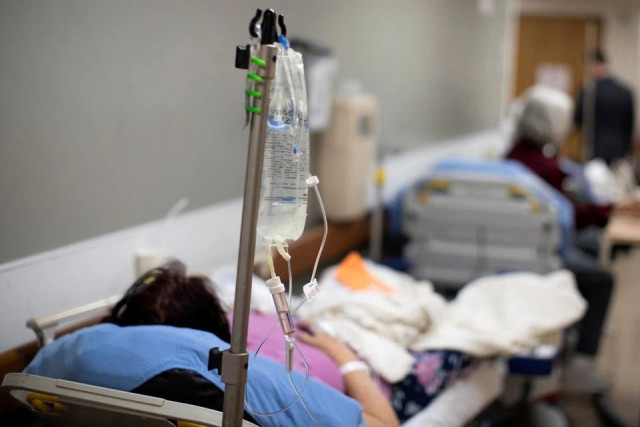Surgeries delayed for months on end
Three of Rawalpindi’s leading government health centres are short staffed and lacking beds

The country’s overpopulation conundrum burdens resources unlike any other problem and the longer policymakers wait to address it, infrastructures like health are getting overwhelmed; further worsening the plight of the populace.
Already crumbling under the weight of the sheer number of patients, hospitals in Rawalpindi Division have recently become the treatment centres of choice for residents of Kashmir, Gilgit Baltistan, and Khyber Pakhtunkhwa.
Resultantly, the 3 major hospitals of the federal capital’s twin - Benazir Bhutto General Hospital, Holy Family Hospital, and District Headquarter Hospital - have been forced to give patients delayed operation dates, which in some cases range from 4 to 6 months.
The Express Tribune learnt that presently 700 cases of elective surgery, neurosurgery, orthopaedic surgery, general surgery, and ENT surgery are pending at the 3 hospitals.
Amongst these pending cases was Muhammad Rafique’s brother, a resident of the city, who had to look for other options due to the long wait time.
“My sibling had to get his leg operated on but the hospitals gave us an operation date six months into the future,” Rafique said, “therefore, we took him to a private hospital which burned a hole in our pocket.”
He further informed that even if one of three hospitals in Rawalpindi had operated on his brother, it would have saved him Rs 150,000 but no one showed any concern.
While Rafique could cough up the money, another resident of the city, who identified himself as Ahmed, said that his relative has to get surgery after having fractured his leg but the city’s hospitals can not take him due to the backlog of patients.
“They said we have to wait 4 months. We cannot afford private hospitals so we have no other choice but to wait.”
There are many others like Ahmed who have been knocking on the doors of government hospitals in the city in the hope of getting quick relief but to no avail.
Chief Executive of the city’s three popular treatment centres, Professor Dr Mohammad Omar, when asked about the plight of patients, conceded that there was indeed a backlog. Dr Omar, who is also the Vice-Chancellor (VC) of Rawalpindi Medical University, said that the number of patients has exceeded the capacity of the hospitals.
Data obtained by The Express Tribune shows the lack of capacity problem highlighted by Dr Omar.
The Holy Family Hospital has a 900-bed capacity; Benazir Bhutto General Hospital has 750 beds; District Headquarters Hospital has a 400-bed capacity - in total 2,050 beds for a city whose population is more than 2 million. However, a lack of beds is only part of the equation.
“Shortage of doctors, support staff and technical staff, and a lack of expansion in the hospitals’ infrastructure are also reasons for the city’s healthcare system being overburdened,” Dr Omar explained.
Since data shows that more than 6,000 patients visit the outpatient departments and more than 3,000 patients visit the emergency departments of the three hospitals daily, The Express Tribune asked the Chief Executive for solutions to the backlog problem and was told that only a new hospital could solve the crisis.
“The establishment of a new medical city on GT Road is inevitable for Rawalpindi. I firmly believe that the Medical City Project will be able to meet the needs of healthcare for our patients in the city and those who visit from other cities,” Dr Omar told The Express Tribune.



















COMMENTS
Comments are moderated and generally will be posted if they are on-topic and not abusive.
For more information, please see our Comments FAQ